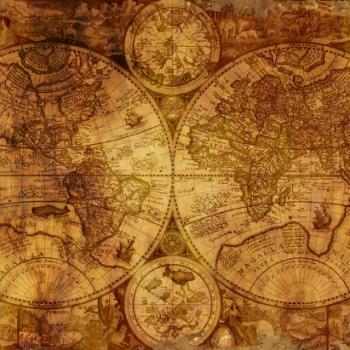
I was introduced to Eastern mysticism in my late teens and became captivated by the guru-disciple relationship. It seemed like such a beautiful way to receive wisdom. I dreamt of everything from intimate lessons to energy transmission.
Yukteswar and Socrates
Two books were instrumental in creating my idea of what a guru-disciple relationship should look like.
First, I read Autobiography of a Yogi several times, both in my native Icelandic and in English. The relationship between Paramahansa Yogananda and Sri Yukteswar was central to the story. Lessons were numerous, everything from Yogananda learning to be a servant leader to the realization at Sri Yukteswar’s deathbed that even enlightened masters showed a slight fear of death when it came time to pass.
Second, a fictional book captivated my imagination. Dan Millman’s Way of the Peaceful Warrior described a relationship between him and a gas station attendant called Socrates, a wise man who taught both difficult and comical lessons.
Sri Yukteswar and Socrates helped me create a glamorized image of what a guru should look and act like. I wanted that kind of relationship.
Meeting My Mentor
I met Yogi Shanti Desai in Iceland in 1998. He has taught me more about spirituality than anyone, and I consider him a mentor and friend. We speak every other week and have our own little Satsang. I tried to make him my guru and call him my guru and wanted him to give me the kind of direction I had seen through the books mentioned above, but he always resisted being put on a pedestal. It wasn’t until I found myself in his shoes that I understood why.
Wannabe Guru
Twenty-one years ago, I opened a yoga studio in Iceland. Soon after that, people started seeking my advice. Faithful to the teachings I had received from Shanti, I resisted being called a guru and repeatedly verbalized that sentiment to my students, but deep down, I wondered if I could become a Socrates or Sri Yukteswar to someone.
Getting caught in that thought process is not easy. I kept putting pressure on myself to live up to ideals I had read about but never experienced. I was a wannabe guru who said he didn’t want to be a guru. Quite the predicament, I admit.
The Problem With Being a Guru
There are many ways to interpret the word guru—from ordinary teacher to enlightened master—but most people seem to gravitate toward the latter. I won’t open the Pandora’s box of what it means to be enlightened in this article; it is sufficient to say that people expect a certain degree of perfection when interacting with someone they see as a guru.
The problem is that perfection is a myth. I’ve met many self-proclaimed gurus in my life and spent enough time with them to know that they are all human, all imperfect in their own way. It took me a while, but I finally realized imperfection wasn’t the problem; it was the expectation of perfection.
Attempting to Have All the Answers
I am perfectly human, meaning that I am perfectly imperfect. I’m okay with saying that now, but ten or fifteen years ago, I was not. I wanted to have all the answers, wanted to be a teacher that guided, and secretly wanted to be put on a pedestal (which is easy to fall off, by the way). It took me more than a decade to realize that no one person has all the answers for everyone.
How Coaching is Different
Even though I have been coaching since 1996, I never thought about it in a spiritual context. That was the domain of priests and gurus and nuns and mystics. They were teachers and guides, not coaches.
However, about two years ago, I started toying with the idea of applying coaching methods to interspirituality by giving slight structure, listening, asking questions for clarification and helping people create their own interspiritual practice. This type of interspiritual coaching was distinctly different from the guru model, less dependent on instruction and more dependent on honoring people’s inner wisdom and inclinations.
Taking the Leap
This year, I took the leap and started offering interspiritual coaching to selective individuals as part of my services. To prepare, I created an inclusive mapping process that honors all wisdom traditions, but the work of choosing and practicing is up to each person. I am just a mirror and guide.
Two things stood out after I made the change.
One, I am not a guru. I don’t have all the answers. That’s okay.
Two, people appear to gain more from coaching than following instructions. Coaching encourages ownership of their spiritual lives and helps them make informed decisions about what to do and what not to do. The shift from external to internal responsibility is huge. It’s like leaving your spiritual parents and starting to make decisions on your own.
Still in Formation
As far as I know, I am one of the few offering interspiritual coaching, and the process is still in formation. So far, it looks promising. I am giving my clients the support I wish I had gotten earlier. This gives me joy because I am a natural helper—it’s what I have always done. I just don’t want to do it from an imaginary pedestal.
Gudjon Bergmann
Author and Mindfulness Teacher
Amazon Author Profile
Recommended books:
- Monk of All Faiths: Inspired by The Prophet (fiction)
- Spiritual in My Own Way (memoir)
- Co-Human Harmony: Using Our Shared Humanity to Bridge Divides (nonfiction)
- Experifaith: At the Heart of Every Religion (nonfiction)
- Premature Holiness: Five Weeks at the Ashram (novel)
- The Meditating Psychiatrist Who Tried to Kill Himself (novel)
Picture: CC0 License












